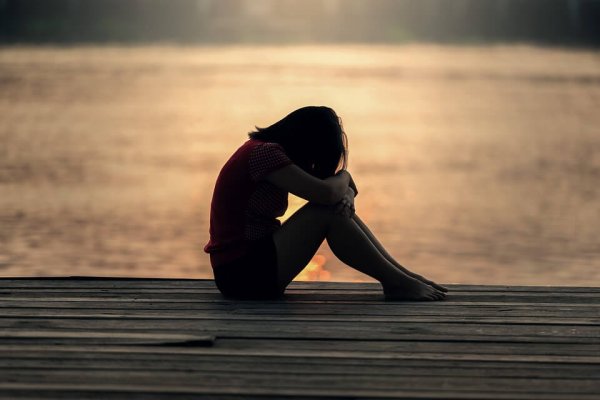Why We Can't Stand Loneliness Sometimes

How we deal with loneliness says a lot about us. Being aware of our moods, thoughts, desires or needs – and stopping to reflect on them – allows us to find psychological stability even in times of conflict. This introspection will be nourished by the time we allow ourselves to be in solitude.
The ability to enjoy voluntary solitude is a sign of emotional maturity and independence that allows us to enhance our self-knowledge.
Is it possible that we’re so unbearable to ourselves that we need others to perceive ourselves as more acceptable? Dependence on relationships and emotional conflicts lead us to an emotional vacuum and to not tolerate loneliness. We fall into codependent relationships, symbiosis, and link confusions based on a sociability that’s not genuine.
“Those who hate loneliness, only hate themselves.”
-Anonymous-
When the silence of loneliness causes anguish
Feeling good in solitude is a very personal experience. Every moment that we spend alone is unique. Different sensations will arise inside us depending on the vital moment we’re in and our psychological state.

Not all minds manage to contain the pain caused by certain conflicts and life circumstances. Sometimes it makes us dizzy to hear our own echo and, therefore, we surround ourselves with outside noise. To avoid being by ourselves, we to try to flee along a path with no exit.
If we can’t bear loneliness, our masks will appear, we’ll set aside authenticity, and we’ll avoid everything. We’ll do everything possible to not be alone and disguise this fear with false justifications. We’ll jump from relationship to relationship without even knowing what we’re looking for. We pour our anguish onto friends and family so that they can bear part of the burden and relieve us momentarily. We’ll try to stop our anxiety with pills. Any option will be valid in order to not face loneliness and the message that resonates in it.
Do a self-analysis
If loneliness generates uneasiness, discomfort, boredom, anguish, or anxiety, it’s convenient to stop and think: am I comfortable with myself? Is there something that concerns or worries me? Could I name the emotions I’m feeling? Can I put into words what’s going through my mind and heart?
When loneliness is uncomfortable or unpleasant, there’s a message begging to be heard. Something’s wrong if we’re constantly spending all our time with other people. Avoiding loneliness at all costs reflects an intrapersonal conflict. If we avoid taking responsibility, we’ll end up looking for any way to relieve this discomfort, without understanding or confronting what’s really happening to us.
Loneliness heals
Faced with certain vital events, solitude is necessary to organize ideas and feelings. Losses and changes generate an emotional imbalance that we need to fix in order to be at peace.
Spending time in private is essential to being able to feel and assume our own experiences. We also need to share our experiences and concerns with, but listening to our voice is very important. Spending time with others should not be a substitute for personal reflection.

Having moments of silence with ourselves urges us to place the focus of attention on our inner world. We’re the only ones who will listen to our thoughts and face our emotions. Nobody else will enter the scene, and the responsibility of knowing how to manage what affects us is in our hands. That’s when we can enjoy calmness and learn to handle the discomfort.
Loneliness allows us to make an effort to understand ourselves. It gives us the opportunity to choose what to do, when, and how, and to enjoy the process.
“Loneliness is the empire of conscience.”
-Gustavo Adolfo Becquer-
Whatever happened to authenticity in relationships?
When we talk about relationships, the important thing is quality and not quantity. Having someone next to you can make you feel just as alone or even lonelier than you were. Company doesn’t ensure individual wellness.
For this reason, we need the affection of others since we’re born. We seek human contact as the social species that we are. Family, friends, couples, co-workers, and each of the social nuclei we’re in are essential for our individual development. Interpersonal relationships shape our personality and influence our social skills and emotional control. However, the ability to be alone is equally or even more important. Hence, being comfortable with yourself is the first step to feeling comfortable with others.
On the other hand, the hyperconnectivity in which we live in leads us paradoxically to a disconnection and deterioration of real bonds. We spend more time communicating through our screens than looking into each other’s eyes. We have access to a multitude of people and have the possibility of generating many relationships, but these are ephemeral and, as a result, don’t satisfy our affective needs. Therefore, we find ourselves uncomfortable if we’re alone and dissatisfied with the new relationships we create.
“The independent character arises from being able to be self-sufficient.”
-Francisco Grandmontagne-

Voluntary loneliness is the best possible company
Enjoying solitude will depend on our introspective capacity, in other words, the capacity we have to analyze ourselves. Also, this capacity reflects the level of commitment and involvement we have with ourselves, that is, to what extent we take charge of our own life without delegating our inner world and conflicts to others. In this regard, it’s one thing to look for the company of others in order to give them whatever you have left over and another thing to look for company in order to fill your voids.
It’s not about always being alone. It’s about the ability to enjoy oneself while being alone. Choosing yourself as a partner and enjoying it, even if you’re able to be with other people, is what makes the difference. This will mean that your relationship with others will be based on desire, not necessity.
“What a lovely suprise to finally discover how unlonely being alone can be.”
-Ellen Burstyn-
This text is provided for informational purposes only and does not replace consultation with a professional. If in doubt, consult your specialist.








